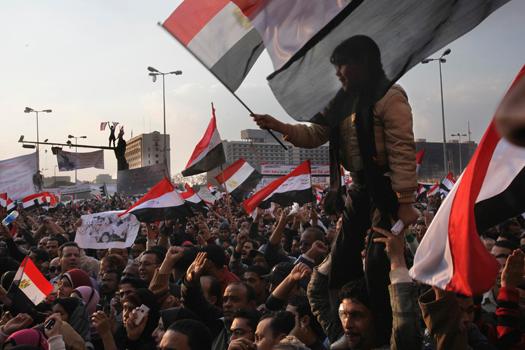Making a Difference in the Middle East
Why the Current Movements in the Middle East are Important to the Average American
July 23, 2011

Published: February 16, 2011
Several months after the Green Movement protests in Iran, I was sitting in my Middle Eastern history class listening to my professor reminisce about the 1979 Revolution. “You should all be embarrassed of yourselves,” he abruptly asserted. “When the [1979] Revolution was happening, youth in America were outside supporting them.”
His statement was poignant. However, I am a college student now. I am a member of Generation Y. I read digital updates of The New York Times. I communicate through texts. I watch TV shows on my laptop. The media for youth activism today are going to be different from those used in the 1970s.
Regardless, I am acutely aware of the importance of being involved in a political movement. The matter at hand is not the futility of political activism. The question is what can the average Generation Y American do? A friend of mine asked me, “What good will liking a Facebook group do for Iranians?”
Well, when Americans went on Twitter, created accounts under the false location of Tehran and helped deter the incarceration of bloggers, it made a difference. When Americans held up the phone lines at the Iranian consulate, it made a difference. When Americans posted BBC links and spread awareness about how the Iranian people want a new regime, it made a difference. When Americans understood why President BarackObama’s administration supported the protesters, it made a difference. When I told my cousins in Iran that Americans know the truth about Ahmadinejad and that they care, it made a difference.
Our parents call our generation “passive” and “lazy.” I would counter these accusations by saying that just because I spend a third of my day behind my MacBook does not mean I am not a concerned citizen of the world. When Western journalists were prohibited from accessing the demonstrations in Iran, cell phone videos were clandestinely downloaded as iReports for CNN to use. When the Iranian government denied the scale of violence, people went on YouTube to watch Neda’s murder. When the anti-Mubarak grassroots movements needed to appoint a starting day for the Egyptian uprising they used the Facebook page, “We Are All Khaled Saeid.” When Mohammed Bouazizi burned himself to death (essentially) in protest of the Tunisian regime, supportive tweets made Tunisian activists the most outspoken at the time in the Middle East.
Since the beginning of winter break, there has been a domino effect in the Arab-bloc starting with the Jasmine Revolution in Tunisia. A notable amount of countries across the Middle East have come to experience equally powerful political uprisings. Egypt is also experiencing a regime change.
An Egyptian friend of mine from Alexandria wrote on my Facebook wall, “Let the people know, we don’t want government interventions… Just know the truth.” On Jan. 28, an Al-Jazeera journalist interviewed a Cairo protester who exclaimed in Arabic, “Please, support us!” I saw Facebook statuses criticizing Mubarak, links to footages of Tahrir Square, event invitations forwarded for protests. Every nanosecond, a new tweet was hashtagged with Egypt or Jan. 25. The amount of awareness and support is breathtaking, and yet it would be criminal for me to say it’s enough.
Why are these current movements in the Middle East important to the average American? If you’ve forgotten, we have waged two wars in that region in this past decade. Egypt, specifically, is one of our only three allies in the Middle East. As a result, we have given them $1.3 billion annually since 1967. The U.S. is also dependent on oil-exports and grain-exports from the region. You may notice an increase in the cost of wheat this March and that is because of Egypt’s state of anarchy. Lastly, you might recall having a friend from—or passionate about—the Middle East. Personally, I can’t address in a succinct sentence how important these last few months have been. Just know that when I went to a protest in support of Egypt in front of the U.N., I was vehemently calling for change together with Tunisians, Saudis, Iranians, Iraqis, Palestinians and Algerians.
Not everyone is inclined to awkwardly hold a sign and strain his or her voice at a protest. Not everyone has time to attend a dialogue on the events happening in Egypt. Not everyone can re-blog an Al-Jazeera link on their Tumblr or Reddit. If not for the sake of the people in the Middle East or for nurturing your own global awareness, please support these political movements so that we can prove to our parents that we’re active—but in a different way.








